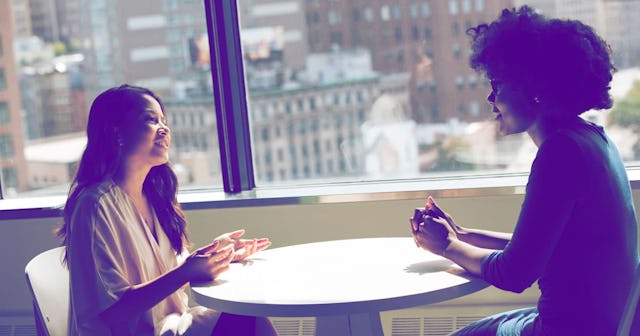You Can Have A Black Friend, Partner, Or Child And Still Be Racist

I shouldn’t have been surprised. After reading an article I’d written on being a multiracial family by adoption and the racism our family encounters, a friend sent me a message that started with, “You know, I had a black boyfriend in college.” (Here we go, I thought.) She then proceeded to lecture me on focusing too much on race, assuring me that by doing so, I would give my black children a complex. She mistakenly assumed that dating a black guy over a decade ago gave her some sort of white woman pass to say whatever she wanted about racism.
I’m used to conversations with white people about race. Too often, they love to throw in terms that alleviate some of their white fragility. You’ve probably heard some of these, including: the race card, black-on-black crime, reverse racism, and colorblindness. These are made-up terms that some white people use to feel better about themselves.
White people don’t get credit for dating a black person. Having a black co-worker, neighbor, friend, or family member also doesn’t come with a lifelong pass to rant about race. You can have connections, even intimate and deep connections, with black people and still do (and believe) racist things.
Lelia Milaya/Reshot
I’m mothering four black children, all of whom were adopted at birth. My husband and I are white. It’s not like when my kids came into our family that all the sudden my white privilege disappeared into thin air, and I was a perfect anti-racism advocate. I’ve been a mom for well over a decade, and I’m still learning every single day. I kick myself for past mistakes, especially since they impact the beautiful children I’ve been chosen to raise.
Despite attending a black church, despite having close black friends and family members, despite committing to fighting racial injustices, I can still do things that are racist. Now, too many people believe that racism is limited to joining the KKK and freely dropping the N-word. This isn’t the case. Racism comes in many forms and presents itself in various ways.
Let’s take microaggressions, for example. A microaggression is a causal, every day form of racism, such as a white person reaching out to touch a black child’s cornrows (you know, because they are “curious”). A white teacher telling an Asian child that they should do better on their math test (based on the stereotype that Asian kids are good at math) is also a microaggression. We’ve experienced countless times when strangers have asked my children if they like basketball and hip hop dancing rather than simply asking them what sports they enjoy, if any. The undercurrent to microaggressions is racism.
There are racist dress code policies that target black children, such as hair policies in school handbooks that ban certain protective hair styles that are popular and traditional in the black community. Black children are punished more frequently and more harshly than their white peers. Black boys, such as my son, are stereotyped as suspicious, rambunctious, and street smart (but not book smart). Black girls, like my three daughters, are stereotyped as sassy, loud, and lazy. Stereotypes are detrimental to everyone, but especially the people being targeted by them.
So, what’s the problem? The issue is that when any white person is called out on their racism, they have a choice to make. Do they listen, learn, and change, or do they retreat to white fragility and white privilege? There’s really no gray area here. This is—pun intended—as clear as black or white.
When a white person claps back with their connection to someone who is black–followed by an “if,” or “but”—and then something racist, the aforementioned connection doesn’t erase the racism. The racism is still there, and to me, is glaringly evident. Stating that one “doesn’t have a racist bone” in their bodies or is “colorblind” also doesn’t mean there isn’t racism that needs to be addressed.
None of us are perfect. I’ve made my fair share of mistakes, and I will continue to do so despite my best efforts, because I am human. When a person who looks like my children tells me I said or did something racist, it doesn’t mean I get to sob white tears and say, “But I have black children.” Doing so centers my whiteness rather than furthering the progress of anti-racism. My job is to close my mouth, open my ears, and take in whatever that person has to tell me. Any other response is unproductive, insensitive, and privileged.
If you have a black partner or children, if you’ve dated a person of color in the past, if you have BIPOC friends and co-workers and neighbors—good. But those relationships do not give you a one-way ticket out of Racism Town. Unless we, as white people, are listening, learning, and changing based on what we’re being taught within these relationships, we aren’t doing any good at all. In fact, we’re doing more harm than good. Clapping back when being called out only proves that white people cannot stand not to be at the center of every single conversation, policy, and action.
We need to do better. That starts with not pulling in our loved ones of color—past or present—into conversations in order to make ourselves appear non-racist.
This article was originally published on